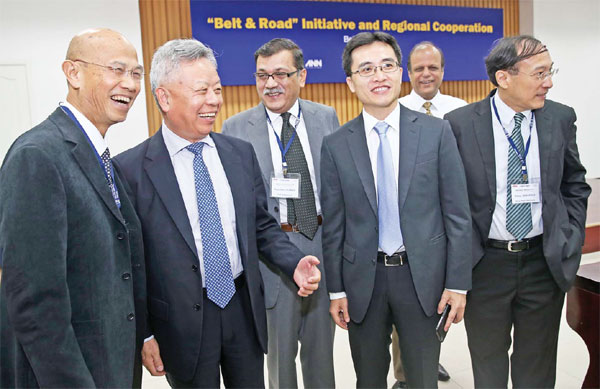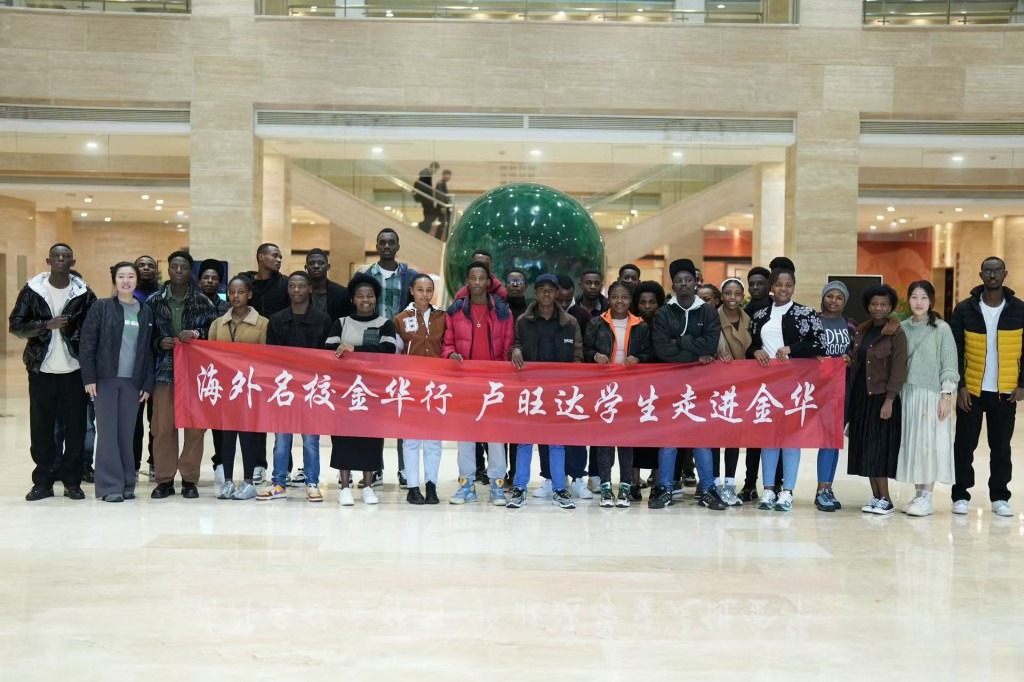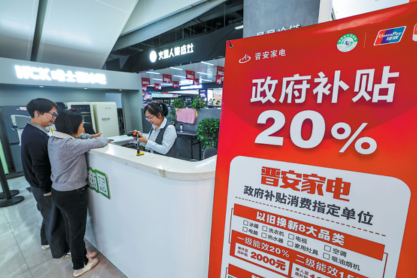AIIB head fields questions from media

| Jin Liqun (second from left), president of the Asian Infrastructure Investment Bank, and Zhou Li (front, second from right), a member of China Daily's editorial board, attend the Belt and Road Initiative and Regional Cooperation seminar with other Asian media representatives in Beijing on May 31. Feng Yongbin / China Daily |
Editor's note: Jin Liqun, president of the Asian Infrastructure Investment Bank, was interviewed by media executives from the Asia News Network during its board meeting at China Daily's headquarters in Beijing on May 31.
How fast will the AIIB expand its membership?
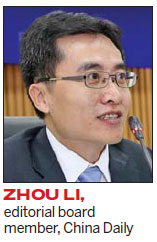
We have 57 founding members. We have about 30 countries waiting to join, of which we have a firm commitment from about 20 countries. Some of the countries are still working on the internal procedure and can't give us a firm commitment at the moment. The deadline for applications is the end of September, and we will try to complete the whole process of membership before the end of this year. So likely, by the end of this year, our membership will be a little less than 100. This is going to be a really international organization with countries from Central and Eastern Europe, Latin America, North Africa, and other regions. So we will be able to work with so many countries across the world. The AIIB promotes, first of all, the benefits of Asian countries, but we don't forget about those that are, by definition, not Asian countries. We support other countries that have a direct and indirect impact on Asia's development.
The AIIB is considering some projects in Asia. Are all of those projects with the founding members?
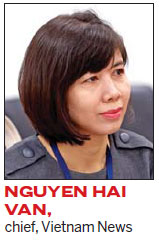
We're going to deliver the first group of projects for board consideration in late June. All the projects will be in Asian member countries, and I'm very happy to see, geographically, they are covering broad areas, including ASEAN members, and countries in South and Central Asia. It's very gratifying to see that we cover so many countries. We will have the second group of projects and the third group by the end of this year. At the moment, we're considering projects with Asian member countries. I'm sure very soon we will be able to cover non-Asian countries, particularly if these countries' economic relations with Asian countries are very strong.
You've mentioned investing outside Asia. Recently, Russian President Vladimir Putin said he invited the AIIB to invest in Russia. Are you going to consider investing in Russian projects?
We finance infrastructure projects in any member countries that are eligible for our funding. It's very clear. But as I said, any project proposed by any government must meet our three basic requirements. So I cannot prejudge any project.
Do you see China's foreign policy complementing the objectives of the organization?
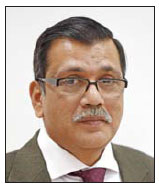
A New York correspondent asked me at Davos whether I think the AIIB is a success in terms of diplomacy. My answer was yes, the AIIB is a success in terms of diplomacy for all 57 members.
What is the desirable ratio between the number of standalone projects and co-financing projects? Are you going to provide financing to projects outside of the Chinese government's priorities, such as the Belt and Road Initiative?
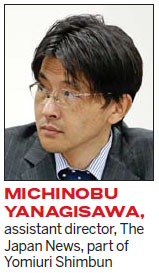
I'm going to get a Japanese national to serve in a very senior position in our bank. Recently, your senior officials came to see me, looking for possible cooperation. I believe we can work together to promote development in Asia. We don't have a fixed target with regard to the ratio of standalone projects regarding co-financing. We'll take in projects that meet our standards.
Probably in the future, there will clearly be a higher proportion of co-financing projects. When it comes to huge infrastructure projects, it's easy to go over $1 billion. It's not really a great idea for one institution to single-handedly manage the finances of a project. But also, just because we're a little bit different from the existing institutions, we don't take poverty reduction as a direct objective. Poverty reduction will be a derivative of our efforts, so our focus will be a little bit different.
Some of the projects that cannot be done by other institutions will be perfectly all right for us to finance. So we could have a clearly greater proportion of free-standing projects, particularly after we have recruited all our operational staff in the next couple of years. When you recruit people, you really have to be sure he or she will be a good team worker, if he or she will work well and achieve high success at this institution.
Imagine you were in the middle of a board meeting, and I were a board member from Thailand. My first question to you as CEO of the AIIB would be: We seem to have a brand image problem. If we are launching a product, people may think this product is Chinese, not international. The question is, how do you plan to correct this brand image?
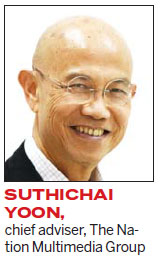
We've heard critical comments on China's initiative. We never engage in vocal arguments with people because it's not worth it. In my view, trust has to be earned. Credibility has to be earned. You cannot talk people into belief. You can exhaust all the nice words in any dictionary and you can still fail to convince these people. Just forget about it. Do your job.
If we have a project to upgrade a slum in an ASEAN state, do you think this is a Chinese project? We clean up the dirty water, we provide safe drinking water, we provide electricity to low-income people. When we finance a project in South Asia, improving the power transmission system and contributing to the reduction of global warming, do you think this is a Chinese project? None of the projects are Chinese projects. All, I would say, are benefiting the local people.
China does not want to borrow from this bank. It doesn't make sense for China to start this bank and borrow massively from it. India can borrow; India is No 2. China does not want to borrow ... even though China has a 30 percent share in the bank and has contributed 30 percent of its $100 billion. China will also contribute $50 billion as a donation to this bank to establish a special fund.
You may remember President Xi Jinping said that, in the past three decades, China has benefited from the general support of the World Bank, the Asian Development Bank and all the bilateral sources, and now it's China's turn to contribute. That is the basic idea or principle of this institution.
So our first group of projects will speak volumes for the basic principle of this institution. With the goal of public institutions, combined with the efficiency of private sector companies, we're going to serve as a new role model. That's why we do not want to clone any existing institution. We want to be a new entity with the strong features of private sector companies and public sector companies. That is why we believe this bank is so attractive.
What is the responsibility of AIIB member countries?
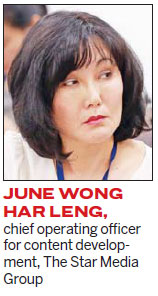
First, I want to take issue with you when you say I pick rosy pictures. I never pick rosy pictures. I always pick the realistic pictures. Certainly my picture involves lots of aspirations on what we aim to achieve. This is not my aspiration; it is the aspiration of the people of all these countries. So let's be realistic.
We cannot achieve all these objectives over a really short period of time, but I think we should always aim at all these grand programs, which would benefit all of the people in all member countries. New members or existing members certainly will place high expectations on this bank. They will certainly try, at least for many developing countries, to get as many resources as possible from this bank. They would like to have as many projects as possible. But we cannot meet all of their expectations. We must achieve counterbalance and regional balance. Sometimes we have to decline ... because we believe some other projects are more important from the regional perspective. ... Probably, the response from other institutions would be the same. If your project does not measure up to their high standard for environmental protection, they cannot do it.
What is the AIIB's budget?
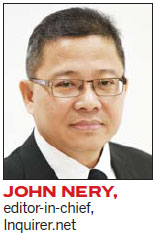
I enjoyed living in the Philippines for a good five years when I served as vice-president of the Asian Development Bank. That platform gave me a lot of opportunities to communicate with people in member countries and also helped me learn more about your great country. The Philippines is a founding member (of the AIIB), and we certainly will look forward to new opportunity to develop a strong relationship with your country.
We're in the early stages, and it's not responsible for me to give you some definite figure of how much we can lend a year, but maybe I can offer you some examples. ADB has a capital base of $160 billion. Roughly, there is $16 billion for lending in a year. The World Bank has $257 billion; their lending program is probably $25 billion to $26 billion a year. So that kind of reference probably will help you arrive at a rough idea.
We depend on the experience of the International Monetary Fund, the World Bank and the ADB if we want to learn more about the macroeconomic situation of a country. We don't have to duplicate the research in these areas. Instead, we can focus our resources on research in other areas, such as renewable energy. But we don't have to duplicate the efforts of other institutions.
You see, it is truly important for us to keep in mind that any country will have particular needs. Just to quote Jane Austen, if I remember correctly, "It is a truth universally acknowledged, that a single man in possession of a good fortune, must be in want of a wife." And this wife is a matter of preference.
What is the AIIB's investment target?
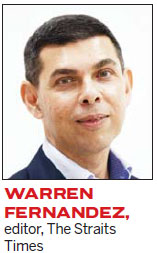
We start with infrastructure - physical infrastructure, to be exact. But since we have other productive sectors in mind, we can probably finance projects in the future for nonphysical infrastructure. For instance, education and healthcare. Or, if we can help a municipal government better design the way it manages, I think it could be very important.
It's certainly important to build roads, but people don't understand if you don't include traffic lights, if you don't manage the flow of the people in the city. Probably no matter how many roads you build, it's still not enough. So you need to better manage the urban problems. That could be part of our efforts.
Now, when it comes to new technology, I have to be cautious about financing. This is not our job. Any investment in new technology has variants. And I don't think it's appropriate to spend our shareholders' money on something with dubious prospects. This should be left for venture capital. But once the new technology proves workable and effective, we can't miss it.
So this is the way we can serve our countries. We apply new technology; we do not invest in developing new technology.
How long until the United States or Japan joins the AIIB?
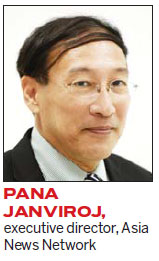
I cannot speak on behalf of the US or Japanese governments with regard to their membership. The door has opened, and it will remain open. This is our basic principle. As we are inclusive, if any country wants to join, they pick up the phone, give us a call and discuss the issues. You know, the conditions are all stated in the articles of agreement. But I want to highlight one point that, regardless of the membership of any country in the world, we can work together.
Companies in the US and Japan can participate in the international competition, and they will be treated equally and fairly. This is our basic principle.
I have already hired some US nationals to work in this institution, in various positions, and we will have Japanese nationals. We are still in the recruitment process. I'm sure the Japanese nationals will meet our standards. We are very happy to have nationals of any country who can serve this institution. So I highlight this point again and again, that regardless of who is a member, there are various ways that we work for the companies and work for the nationals.
When you describe reforming distribution, what do you feel was lacking in the decision-making and distribution at the IMF, ADB or World Bank. Were the decisions politically motivated, and did that prompt you to advance this idea?
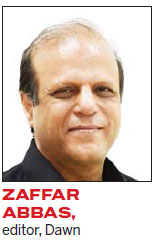
We can evaluate the performance or contribution of any international institution only from a historical perspective. The Bretton Woods institutions were created before the conclusion of World War II. So it was timely for all these countries to meet in Bretton Woods, New Hampshire. China was also a member. The Bretton Woods institutions, and the new institutions that were created based on these institutions, have contributed enormously to international financial or economic stability, to reconstruction and re-adoption of recruitment.
No institution or individual is perfect. So when we talk about the international financial order, or international economic order, you may have noticed the Chinese position is that we do not intend to upend the existing international financial order because in China we have also benefited from this system, particularly over the past three decades. Now, I understand these institutions are also trying to improve, to undertake reforms, to make them serve better.
We were all created in the 21st century, meeting the needs of countries in the 21st century, so we have a lot to learn from the existing institutions, and we also enjoy the advantages of the institutions of different cultures. And any institution will make mistakes. I don't think we will be flawless.
What is important is to understand the reality and acknowledge or confess that you made mistakes - and that you will have the guts to confess and to correct. No mistake is a mistake unless you don't want to take it back. So this is important for understanding. It's not appropriate for me to make judgments on the merits or demerits of existing institutions. My job is to learn from the strong points. I would say this is the shared view of all 57 members of the AIIB, because they are all members of existing institutions, right? So when some people asked me whether I'm worried about rivalry with the World Bank or ADB, I tell them that I worked for six years on the board of the World Bank, five years in management. If you think the sibling, the new institution, has sold out the existing institution, I would not agree.
What is lacking in the practices of existing institutions? It's not appropriate for me to comment on the merits or demerits. But one essential fact is that the existing institutions mostly are made of the developed nations. This institution is made by developing nations, so we can offer the development experience of developing countries that has accumulated over the last half-century, particularly the past three decades.
Will the Chinese government ask the AIIB to finance all its infrastructure projects?
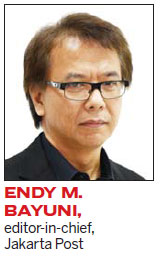
The US basically shuffled the order of the World Bank. Japan has numerous financial assistance programs. Many European countries also have their own financing systems. So the way they handle this is also offering some experience.
If I have to be specific about the relationship between the AIIB and Chinese financial systems, I do not rule out the possibility that we can work together if they follow our standards and rules. For instance, we have Chinese development institutions that may finance ideas or infrastructure in some countries.
(China Daily Africa Weekly 06/03/2016 page14)
Today's Top News
- US sanctions, accusations of hacker attacks slammed
- Plateau poised for world-class copper hub tag
- Foreign visitors need home-like convenience
- Xi calls for winning tough anti-graft battle
- Foreign institutions express confidence in A-share market
- Trudeau to resign as Canada PM
















